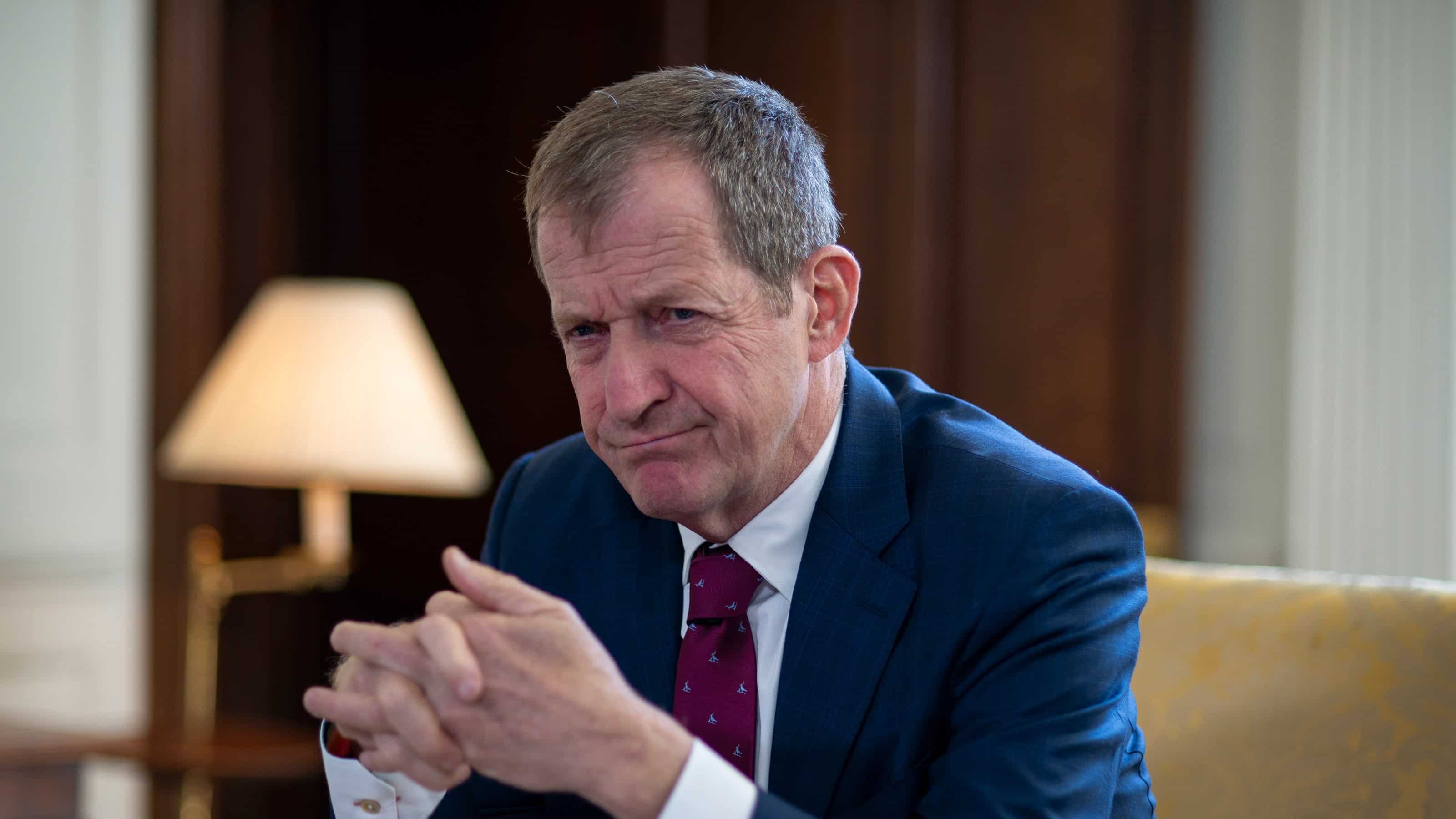Alastair Campbell on Liz Truss: “She gaslights, she lies, she’s not great with people”

A stalwart in British politics, Alastair Campbell, came to the public eye as former prime minister Tony Blair’s spokesman, press secretary and director of communications and strategy. The broadcaster, writer and mental health campaigner, who published an acclaimed eight-volume diary series on his time with Blair, has since launched a hit current affairs podcast, The Rest is Politics, alongside erstwhile Conservative cabinet minister, Rory Stewart, where they practice the art of “disagreeing agreeably”. Campbell is soon due to star in Channel 4’s upcoming reality television series, Make Me Prime Minister, which sees him and former conservative party co-chair, Sayeeda Warsi, put political hopefuls to the test through gruelling leadership challenges. Here, he chats to HUNGER about why Liz Truss wouldn’t have made it to the end of his new show, and what Kier Starmer needs to do now.
In July, you told the Guardian: “Liz Truss as PM is so appalling it’s almost unthinkable – which means it could happen”. How do you feel now that the “unthinkable” has actually happened?
I feel pretty desperate about the state of the country, to be honest. It’s not personal about her, I just think that the politics that first [Boris] Johnson and now she represents is just so, so, so wrong for Britain and what we could be in the world. I don’t buy the idea that she’s a sort of Margaret Thatcher too. She’s kind of a Johnson without the bits that people like about him, she’s a populist… She’s probably harder working than him, but it seems to me that her politics are driven by a very narrow set of quite idiosyncratic views. And she’s now a prisoner of these very right-wing forces that have gotten her there, and you see that in her cabinet. So I’m very, very down about it. The other thing is that I go around different parts of the country and I don’t find any enthusiasm for this government at all. And what they’re banking on is to pretend for the fourth time that this is somehow a new government. These people have been in for 12 bloody years. It’s a mess.
What are the policies that you’ll be most concerned about as we move into Truss’ government?
The policies flow from the values and it’s that that I worry most about. For example, on the economic policy, I think she’s pretty far out in terms of a view. I think we’re going back to a sense of providing you look after the rich, the poor will be fine. It’s the old trickle-down and it’s never worked. And then, on social policy, they’re pretty right-wing. I think Suella Braverman is a very, very right-wing home secretary, possibly even worse than Patel. The top jobs are now in the hands of people who are very, very, free-market libertarians and anti-regulation. Truss is just someone who will go with the wind, but the real true believers in Brexit are now dominant within this cabinet. Brexit was about taking away the rights and protections that were actually of benefit to people in favour of this very, very right-wing worldview. Look, she may try and prove us wrong, but I can’t see it because although there’s a massive focus on the prime minister, she is going to be even more dependent on her cabinet than Johnson.
Do you think the policy of deporting people to Rwanda will continue with Braverman — as you’ve rightly pointed out, she too is incredibly right-wing.
Priti Patel made it clear in her resignation letter that she’s keeping a beady eye on the whole thing. I think they’ll keep it in theory. I don’t believe that it was ever designed as an actual policy, I think it was all about positioning and signalling. Eventually, it will probably erode, but she’ll find some other half-baked idea to pretend they’re dealing with the ‘problem’. This is why I can’t stand this whole populist approach to politics — populism is about politicians exploiting problems for political gain rather than addressing those problems to make life better.
We’ve had our fourth prime minister in six years, and on your podcast, you said that that is something that is normally associated with failed states. What is the way up from here?
It’s associated with failed states, but we’re not one. You could argue that Boris [Johnson] is gone, for example — sure it took an awfully long time, and Truss and the media are still defending him. But we do also have greater wealth than most countries. We have a health service, universal education, etcetera… So I’m not saying we’re a failed state, I’m simply saying that the level of churn in regards to the prime minister is something that you would associate with a failed state. But we are a country and society in decline and in considerable peril. When you look at these energy prices, [the new cabinet is] obviously going to do something to try and alleviate them, but that then means that they’re going to take money away from other things. The NHS does an amazing job, but if you talk to anyone who works there, they’re under massive pressure… The same with the state school system. If you talk to people in the police force, they say that there are certain crimes that are very difficult to keep on top of, because they just don’t have the resources to do it. These are all signs of a country that is in real difficulty.
And do I see any hope? I don’t see any hope while this kind of politics is the dominant strain. I see populism as a virus and I think it’s affected all sorts of countries from America and Brazil to India, Turkey and Russia. At the moment, Labour are well ahead in the polls, but it’s not a shoo-in. I want the labour party to step up on the campaign front, on the policy front, just to give people hope, otherwise, democracy dies.
Obviously, the opposition always has to pivot to fight a new leader. How do you think Labour and Kier Starmer will need to adapt to battle Truss’ government?
You’re right, the leader does shape it to some extent. I do think that Johnson’s showbiz style of politics and his lying was a new phenomenon. It made him a very difficult opponent across the dispatch box because Starmer is a lawyer by training, he’s very proper, he believes in following rules. He’d have loved to have called Johnson a liar, but he knew he couldn’t say that in parliament. Because Truss doesn’t have those same skills of flamboyance, language, rhetoric, I think she’ll be starting from a low base, and I think Starmer’s studied, lawyerly, forensic approach will actually lend itself quite well to her style. Hopefully, that will help get us back to a more serious kind of debate. But at the same time, he shouldn’t be put off by the fact that she’s a woman, he does have to land blows. And she is now the only member of that cabinet that’s been there the whole time, so he should pin an awful lot of what has gone wrong with the country on her.
Changing tack, we’ve had three two female Tory party leaders in a relatively short space of time — but the same can’t be said for the labour party. Why do you think this is and are there any contenders?
You’re right, the Tories have had three female prime ministers now. People are making the point that it’s impressive that within Truss’ cabinet, none of the four great roles are filled by a white man, but at the same time, if you take Truss out of it, the three non-white people in there are all privately educated. And I would argue that in this debate, where politics has lost a real sense of diversity, is in a class sense. There are lots of good women in the Labour party, but we still haven’t reached that point where there’s an obvious choice, like when it was when Starmer became leader. I’ve never thought you should rule out 50 per cent of the talent pool because you have to pick a man or a woman. It should be the best person.
In my opinion, the Labour party also has a bit of an image problem. Right now, the Tories are way more diverse — just look at Truss’ current cabinet. Would you agree?
The fact that you’re saying it means that there is a problem. I think that because of the way that various waves of immigration have developed politically, their politics have veered predominantly towards the labour party because they feel like they care more. It’s a generalisation, but I think that’s still the case for many people, and it’s led to a rather patronising assumption that if someone’s not white, they’re more likely to vote Labour than Tory. Voices on the left basically talk about ethnic minorities as though Labour is always there to help them when actually they’re just as interested in messages about aspiration and the future. Many, many people who are non-white in our country are entrepreneurial, they want to get out there, and they feel the Tory party is for them, and that’s perhaps why we’re seeing more non-white people in these senior positions.
You’ve got a new show coming out called Make Me Prime Minister. How was making that and did it change your conception of what skills are needed to make a prime minister?
What persuaded me to do it was the idea that there is so much despair about the state of politics, I wanted to see the sort of people who were interested enough to put their heads above the parapet and go for something like this. Some of them, you couldn’t remotely imagine as prime minister, but others, I could easily imagine in senior positions in elected politics. I was doing a chat with some journalists the other day, and someone asked how we thought Truss would have gotten on as a candidate. We all said that she wouldn’t have made it because she gaslights, she lies, and she’s not great with people.
Obviously, being a prime minister is way more complicated than being a contestant in a television series, but we gave them policy, crisis and communication challenges, as well as team leadership challenges. It was interesting to see how they developed throughout the process, and I found it fascinating how little they were actually following and engaged with what was happening in the real political world,. They felt so divorced from the political climate in regard to their personal attitudes and values. Politics has to change to adapt to younger people who have a new way of thinking.
Amongst those candidates that were leagues ahead of the others, what were the skills that set them apart?
When you see them, it’s an authenticity that is often lacking in our politicians, empathy, and a willingness not to see barriers. The truth is that if they did get involved in the political process as it exists now, they would very quickly come up against a lot of barriers. But in the process, they were motivated by real values, real beliefs, and a sense of what we’ve got is absolutely shared.
But don’t you feel that every politician starts out like that and slowly gets broken down?
You’ve listened to the podcast, and Rory Stewart openly says that he felt like he was almost destroyed as a human being by politics. I think at some point there needs to be a generational shift where people come in and decide that we’re not going to carry on doing it in the same way. We’re not just going to have cabinets where you appoint your best mate to deputy prime minister, where it’s not okay to stand at the dispatch box and lie… If it doesn’t change, then we are frankly fucked as a country and even as a democracy. But I hope there’s enough energy out there. We’ve got to get involved, and listen, it’s not guaranteed that it’s gonna get better, it’s only going to get better if people decide that we’re gonna make it.
Make Me Prime Minister airs on Channel 4 later this month.

